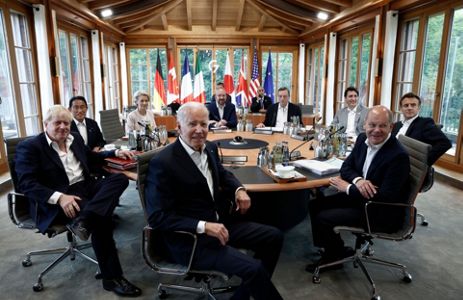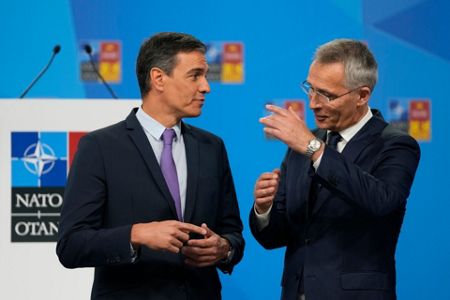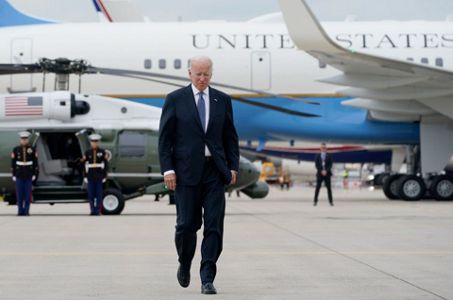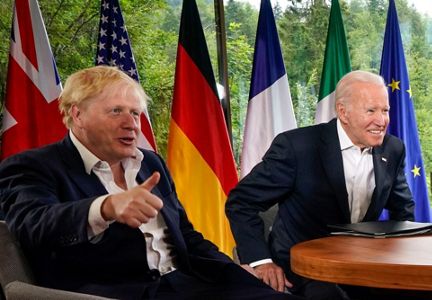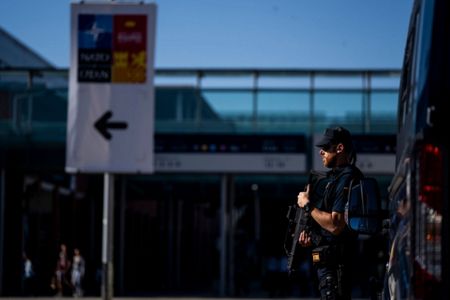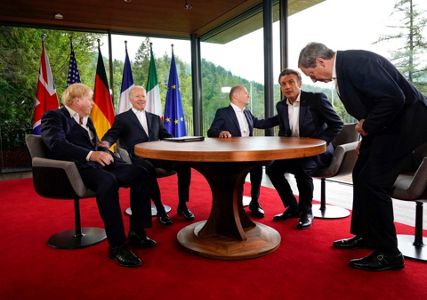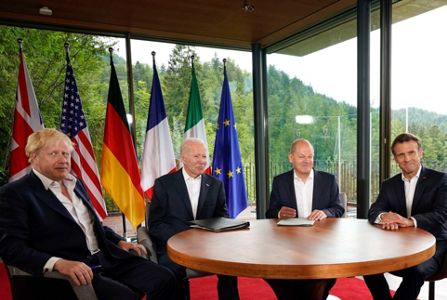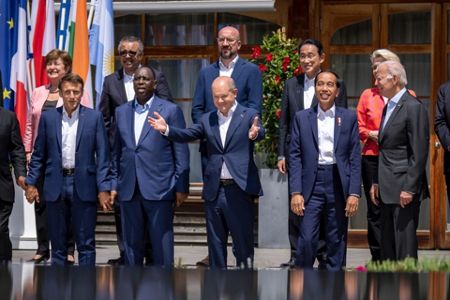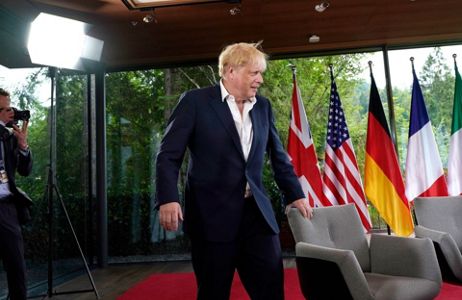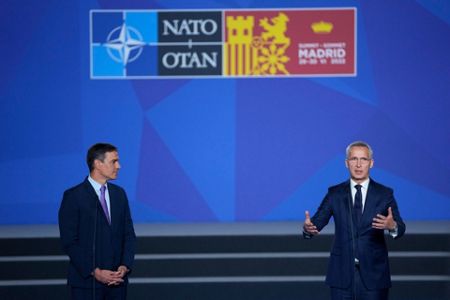ELMAU, Germany (AP) — The Latest on the G-7 summit, the annual meeting of the leading democratic economies, which this year is being held in the Bavarian Alps in Germany; and on the NATO summit in Madrid, where leaders begin gathering later Tuesday:
___
French President Emmanuel Macron is calling on oil-producing countries to boost output and thereby lower world prices pushed up by the war in Ukraine.
He said Tuesday the prices are putting European economies in an “untenable” situation.
Speaking at the end of a G-7 summit in Germany on Tuesday, Macron welcomed the group’s discussions on a price cap for oil as “a very good idea,” but added: “The difficulty is technical.”
He said it’s crucial to include all major oil-buying countries in any cap agreement for it to be effective.
Macron said he discussed boosting oil production with the president of the United Arab Emirates, and expressed hope that U.S. President Joe Biden gets a “positive response” in talks about oil in an upcoming visit to Saudi Arabia.
Macron said oil producers have an “immense responsibility given our collective dependence on them.”
He called for expanding Europe’s liquefied natural gas processing capacity and lashed out at speculation by energy traders he called “war profiteers.”
___
KEY DEVELOPMENTS:
— How a G-7 ban on Russian gold would work
— Zelenskyy tells G-7 summit Ukraine forces face urgent moment
— The AP Interview: Spanish PM says NATO summit to show unity
— NATO holds summit with gaze on Russia — and China
— Tale of 2 summits: ‘America’s back’ to America’s backsliding
___
OTHER DEVELOPMENTS:
Canadian Prime Minister Justin Trudeau has called NATO plans to boost its rapid reaction force “measured and proportional” and not meant to provoke Russia.
Speaking Tuesday at the end of a G-7 summit in Germany and before traveling to Spain for a NATO summit, Trudeau said Canada, is “committed to making sure we continue to stand up against Russian threats and Russian posturing.”
According to the government, about 1,400 Canadian troops are currently deployed in central and eastern Europe as part of NATO assurance and deterrence measures.
“The response that we are taking to Russia’s illegal actions is measured and proportional,” he said, adding it should not be considered a “provocative” move.
“We are looking at ensuring that Russia knows we will be there to defend democracies,” Trudeau said.
___
French President Emmanuel Macron says Russia “cannot and should not” win the war in Ukraine, a day after a Russian missile strike killed 18 people at a Ukrainian shopping mall.
Speaking at the end of the Group of Seven summit in Germany on Tuesday, Macron said the seven developed economies have devised a plan to support Ukraine and maintain sanctions against Russia “as long as necessary, and with the necessary intensity.”
As fighting in Ukraine rages into the fifth month, Macron said it’s not clear when the war will end but the goal of Western democracies is, “Russia must not win.”
His comments came as rescuers searched through the charred rubble of the shopping mall. Macron called the attack a war crime.
___
MADRID — NATO’s chief says Russia’s invasion of Ukraine has sparked a “fundamental shift” in the alliance’s defense policy, and NATO members will have to invest more in military spending in what is now a more unstable world.
NATO Secretary-General Jens Stoltenberg spoke as the alliance’s leaders began gathering Tuesday in Madrid for a summit that will set the course of the alliance for the coming years.
Stoltenberg said the meeting would chart a blueprint for the alliance “in a more dangerous and unpredictable word.”
Top of the agenda is strengthening defenses against Russia and supporting Ukraine in its fight against Moscow’s invasion.
Stoltenberg said “we hope to make progress” at the gathering in breaking a logjam over applications by Sweden and Finland to join the alliance. Turkey is blocking the move and says the Nordic pair must change their stance on Kurdish rebel groups that Turkey considers terrorists.
The three countries’ leaders are due to meet in Madrid, alongside Stoltenberg, later Tuesday.
___
German Chancellor Olaf Scholz is defending the decision by Group of Seven leaders to soften their commitments on ending public support for fossil fuel investments.
The leaders say the war in Ukraine means time-limited support for new natural gas extraction projects may be necessary.
The G-7 nations said in a statement Tuesday at the end of their three-day summit that “in these exceptional circumstances, publicly supported investment in the gas sector can be appropriate as a temporary response.”
That contrasts in part with a previous pledge made last month by G-7 climate ministers, who said that the seven major economies would “align official international financing with the goals of the Paris Agreement.”
Environmental campaigners, scientists and U.N. Secretary-General Antonio Guterres have spoken out against any additional fossil fuel investments by rich, developed nations.
But Scholz told reporters that “gas will be needed temporarily and that is why there may be investments that make sense, in this transitional phase, and that therefore may need to be supported.”
One of the arguments made by German officials in favor of supporting new natural gas development projects is that it could spare them having to burn more polluting coal to meet their energy needs.
Environmental groups argue that building additional pipelines and other infrastructure for surging U.S. LNG exports to Europe and for other fossil fuels will lock in increased carbon use for years to come.
___
Members of the Group of Seven major democratic economies have vowed to create a new ‘climate club’ for nations wanting to take more ambitious steps on global warming.
The move, championed by G-7 summit host German Chancellor Olaf Scholz, will see countries that join the club agree on tougher measures to reduce greenhouse gas emissions with the aim of keeping global temperatures from rising more than 1.5 Celsius (2.7 Fahrenheit) this century compared to pre-industrial times.
Countries that are part of the club will seek to harmonize their measures so that they are comparable and avoid members imposing climate-related tariffs on each others’ imports.
Speaking at the end of a three-day G-7 summit, Scholz said the aim was to “ensure that protecting the climate is a competitive advantage, not a disadvantage.”
He said details of the planned climate club would be finalized this year.
___
Leaders of the world’s wealthiest democracies have taken a united stance to support Ukraine for “as long as necessary,” as Russia’s invasion of its neighbor grinds on for a fifth month.
The final statement from the Group of Seven summit in Germany said Tuesday the countries would “explore” far-reaching steps to cap Kremlin income from oil sales that are financing the war in Ukraine.
The statement left out key details on how the fossil fuel prices caps would work in practice, setting up more discussion in the weeks ahead to assess measures on barring the import of Russian oil above a certain amount.
That would hit a key Russian source of income and, in theory, ease the energy price spikes afflicting the global economy as a result of the war.
Leaders also agreed to a ban on imports of Russian gold and to step up aid to countries hard hit with food shortages by the blockage on Ukraine grain shipments through the Black Sea.
Unity in the seven democracies’ confrontation with Putin was a key theme of the summit at a luxury resort in the Bavarian Alps.
The G-7 countries have set aside $29.5 in Ukraine assistance this year, on top of $60 billion since Russia’s annexation of Ukraine’s Crimea region in 2014.
___
Group of Seven leaders have agreed to spend $4.5 billion on addressing food security issues around the globe exacerbated by rising grain and food costs following Russia’s invasion of Ukraine.
The White House said Tuesday that the United States is pitching in $2.76 billion toward the effort. The funding will be used to assist 47 countries and regional organizations dealing with food insecurity and malnutrition.
The White House says the most immediate needs are in the Horn of Africa, where the Russian blockade of grain from Ukraine has worsened an already desperate situation. The Horn of Africa is experiencing a fourth straight season of drought, with as many as 20 million facing the threat of starvation by year’s end, the White House says.
The Biden administration said in a statement that Russian President Vladimir Putin’s actions “have strangled food and agriculture production and have used food as a weapon of war.”
___
ISTANBUL — Turkey’s president says he spoke with U.S. President Joe Biden on Tuesday morning and may meet with him at this week’s NATO summit in Spain.
The White House said Biden “looks forward” to seeing Turkish President Recep Tayyip Erdogan in Madrid.
Erdogan told a press conference in Ankara ahead of his departure to Spain that Biden “expressed his desire to get together again tonight or tomorrow and we said ‘possible.’”
Erdogan said the pair would discuss Turkey’s requests for upgraded F-16s but said there were “diversionary tactics” at play. He didn’t elaborate.
Erdogan is infuriated by U.S. military bases in Greece and says the U.S. has been fixated on Turkey’s purchase of Russian-made S-400 missiles — a step that led to Ankara being kicked off the F-35 stealth jet program.
Erdogan confirmed he plans to meet with the leaders of Sweden and Finland, along with NATO’s secretary general, to continue discussions on Turkey’s objections to the two Nordic countries’ NATO membership bids.
Ankara has objected to Sweden and Finland’s bid to join NATO, citing what it considers to be their lax approach toward groups Turkey deems national security threats, including the Kurdistan Workers’ Party, or PKK, and its Syrian extension. American support for Syrian Kurdish fighters in combatting the Islamic State group has also enraged Turkey for years.
___
British Prime Minister Boris Johnson says Western leaders are “working on” a plan to free millions of tons of grain stuck in war-torn Ukraine due to Russia's invasion.
Vast amounts of corn and other grains are stranded in Ukraine — one of the world’s largest producers — and because Russian forces have blocked the country’s ports.
Asked by reporters at the start of a Tuesday meeting at the Group of Seven summit what was being done to solve the problem, Johnson said officials were trying to find a solution.
“We’re all working on that,” Johnson said.
His comments came at the start of a meeting with U.S. President Joe Biden, French President Emmanuel Macron, German Chancellor Olaf Scholz and Italian Prime Minister Mario Draghi.
___
U.S. President Joe Biden is leaving the Group of Seven summit in Germany earlier than scheduled due to bad weather.
Biden had been scheduled to deliver remarks during Tuesday’s closing session of the gathering of leaders of developed economies before flying by helicopter to Munich. From there, he would fly via Air Force One to Madrid for the NATO summit.
But the White House announced that with foggy conditions, low cloud and a chance of thunderstorms near the summit site, Biden would have to go by motorcade part of the way to Munich.
Ahead of his early departure, Biden met with British Prime Minister Boris Johnson, French President Emmanuel Macron, Italy’s Prime Minister Mario Draghi and summit host Chancellor Olaf Scholz.
After arriving in Madrid, the U.S. president is scheduled to meet separately with Spanish Prime Minister Pedro Sánchez and King Felipe VI and take part in the NATO summit’s opening dinner.
___
The Group of Seven developed economies are wrapping up a summit that aims to demonstrate a long-term commitment to Ukraine’s future, as its war with Russia grinds on.
The talks in Germany, which draw to a close Tuesday, want to make sure that Russia pays a high price for its invasion. The goal is also to alleviate a global hunger crisis and show unity against climate change.
The leaders of the U.S., Germany, France, Italy, the U.K., Canada and Japan on Monday pledged to support Ukraine “for as long as it takes.”
Later Tuesday, attention shifts to Spain, where a two-day NATO summit is being held in Madrid.
The leaders of the world’s most powerful military alliance open discussions Wednesday on increasing support for Ukraine’s fight against Russia and boosting forces on NATO’s eastern flank.
They also intend to set priorities for the coming decade, with a new focus on checking China’s growing international ambitions.
Copyright 2022 The Associated Press. All rights reserved. This material may not be published, broadcast, rewritten or redistributed without permission.





